Big
Star
I didn't know it could be this
way.
Albums
reviewed
on this page: Cry Like a Baby, Dimensions, Rock
City, 1970, #1
Record, Radio City,
Live, Third/Sister
Lovers,
I am the Cosmos, Bach's Bottom, One
Day in New York, Like
Flies on Sherbet, Live in
London,
Feudalist Tarts, No Sex, High
Priest, Dalai Lama, Black List, Clichés,
A Man Called Destruction,
Set.
Big
Star were a Memphis power-pop band in the early to mid 1970s.
While the mainstream passed over their work, it influenced
those
who did hear it, such as future members of the dBs. Led
by Alex Chilton and Chris Bell, who both played guitar and
sang, Big Star was only one of a couple of
groups (including
Cargoe, Rock
City and
the Hot Dogs) releasing material on the doomed
Ardent label,
recording in the same studio and playing around with pop songs in a
town known for its soul.
Finding no success with their splendid #1 Record, Bell
soon quit, and Chilton put together the terrific Radio City.
Again, the album went nowhere, and bassist Andy Hummel quit.
Down to only two people
(Chilton and Stephens) the duo
started recording a third album, which they abandoned in 1974. Chilton
went solo, and Big Star's last attempts were released four years
later to much acclaim. Bell recorded a bunch of solo
recordings, but died in 1978; Stephens works at the recording
studio in Memphis; Hummel became an aerospace engineer. Big Star's last
album marked the start of Chilton's "fuck this" period, which lasted
through the mid 80s. After he mellowed (or recovered) he
started to do his material straight,
embarked on a careening solo career that found him acting like a 60s
soul/R&B cover band from the mid-80s at least through the
mid-90s.
(Occasionally, he'd pen a good sarcastic original amongst the
covers and re-creations). Big Star reunited in
the
1990s, if by "reunited" you mean Chilton + Stephens + two
guys from the Posies. Chilton himself passed away in 2010.
Big Star: Chris
Bell
(guitar, vocals), Alex Chilton (guitar,
vocals), Jody
Stephens (drums), Andy Hummel (bass). Bell
left
1972, and Hummel quit in 1974. John
Lightman replaced
Hummel for some live shows. Band
disintegrated thereafter.
The
Box Tops: The
Letter/Neon Rainbow
(1967)
Chilton's
soul group, often just him and session players. The title
track was a
big hit.
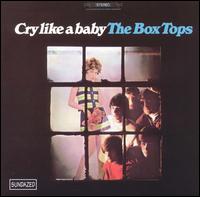 The
Box
Tops: Cry
Like a Baby
(1968), **
The
Box
Tops: Cry
Like a Baby
(1968), **
A
teenage Alex
Chilton first came to fame as the lead singer of this group.
Not
that you hear much of the real group; songwriters Dan Penn and Mike
Oldham provided most of the material and Penn's
production
is easy-going southern pop: piano/organ in the middle, strong bass
lines, scant guitar, horns, strings, even gospel backing vocals on
occasion around Chilton. (Weirdly,
the album's closest approximation to rock is a cover of Motown's "You
Keep Me Hanging On"). What
made the "group" work was Chilton's voice - leaning
heavy on the accent and gruffness, using the lower part of his voice,
making him sound like a man in a mid-life
crisis. The songs
are mostly unmemorable soul and pop numbers, although I like the cover
of "Weeping Analeah", and some of the Penn-Oldham songs are decent
("Every Time", "Fields of Clover"), even if they lack something.
Fortunate then, that the Penn-Oldham title track was a huge
hit
(and a great song) - using every production aspect mentioned above, and
including a catchy electric sitar solo. Not much to stir
your
soul, but nothing obnoxious.
The
Box Tops: Non Stop (1968)
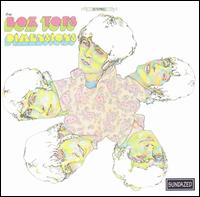 The
Box Tops: Dimensions (1969)
, **1/2
The
Box Tops: Dimensions (1969)
, **1/2
All
hail the five headed Chilton! This
was the
Box Tops' final album, still using the same basic approach: Chilton
singing over the studio house band. Both Penn and Oldham
weren't
involved, and the material is stronger. The
producers (Tommy Cogbill and Chips Moman) pulled back on the horns and
strings and let the band stretch out more than on Cry Like Baby; so Dimensions
has electric guitar solos ("Together"), blues numbers
fronting
piano ("I Must Be the Devil"). In other words, it sounds like
a
band playing on it (true); just not the actual Box
Tops. The
album's big single was "Soul Deep" which employs the Chilton soul voice
successfully for more AM gold. When I first put this album
on, I
instantly went - "oh, this is THAT song" - it was anonymous radio
favorite of mine. Given
that they recorded pop music, the ones on here are surprisingly decent
- "Sweet Cream Ladies" about prostitutes, Neil Diamond's "Ain't No
Way", Chip Taylor's "I'll Hold Out My Hand", and Chilton's own
"Together" and "(The) Happy Song" in a folky/country version.
(Also, this album makes me realize that Chilton sounds like a southern
Neil Diamond.) Even so, they might have run out material, as
the
album concludes with a long blues number, built around "Rock Me Baby",
which is basically the house band doing jamming with restraint.
As far as late 60s pop albums go, this is pretty solid, and leagues
beyond some of the Chicago dreck, mostly due to the uncredited guys
playing on it.
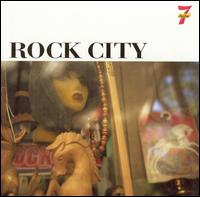 Rock
City (rec.
1969-70, rel.
2003), **
Rock
City (rec.
1969-70, rel.
2003), **
Rock
City was a studio band with a pre-Star Bell and
Stephens,
along with
Thomas
Dean Eubanks on bass and Terry Manning on keyboards.
Eubanks
was Rock City's main figure, writing most of the material and endowing
it
with his hoarse vocals. Most of his work seems like
a
scrapbook of others' post-psychedelia ideas:
acoustic intros to hard rock ("The Answer"), tough acoustic rock
("Introduction"), dramatic soul ("Shine on Me"), pre-prog solo organ
("Sunday Organ"), and some middling power-pop ("I Lost Your Love", "I
Think It's Time to Say Goodbye", "Lovely Lady"). The album's
standout
track is Bell singing an early version of "My Life is Right", even if
he almost wails on the chorus. His guitar work is
usually a
song's high point ("I Lost Your Love" is a good example) but it can't
offset Eubanks' damn irritating habit of scooping his
vocals ("The
Wind Will Cry for Me") which makes me ding the album's rating.
With some better songs, or even with a
better
singer this would do better. As it is, Bell's plaintive,
confessional
songs (including a version of "Try Again") don't do well when
surrounded by Eubanks' fake knockoff versions
of others' big ideas. A historical curiosity.
The CD re-issue also includes a couple
of "extra"
tracks: both sides of Eubanks' T.
Rex-rip off "Oh Babe" from 1974, and a post-Rock City take on
"Feel"
with Bell, Stephens and Manning, which is pretty close to the Big Star
version. Eubanks faded, while Manning continued as a studio
engineer and backing player for others, including Chilton and The
Hot Dogs.
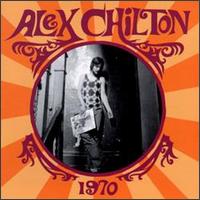 Alex
Chilton: 1970
(rec.
1970, rel. 1996), **1/2
Alex
Chilton: 1970
(rec.
1970, rel. 1996), **1/2
At
this point it was not entirely clear what Chilton was going to do.
Post-Box Tops, he recorded these sessions in Memphis with
many of
the people in the same scene which would produce Big Star, before
embarking on a failed attempt to become a folkie in New York. 1970 shows
Chilton trying on several styles, and distinct voices as
well. His Box Top soul growl ("I Can Dig It", "Free
Again",
"All I Really Want Is Money") or a bluesier tone ("Just to See You",
"Come on Honey" covers of "Jumpin Jack Flash" and "Sugar Sugar") .
Most of these tracks have some big limitations: his main
backing
band (producer/musician Terry Manning and drummer
Richard Rosebrough) are merely adequate, and some slide guitar gives
the album that according soul/country feel. Nor do these
songs
have much in the way of hooks, with the exception of "Something Deep
Inside". However, you do hear the future focus of Big Star's
sound: good vocals and excellently recorded guitars. Chilton
also
has a good sense of humor, and a good portion of these songs are
probably tongue-in-cheek, such as his heavy cover of "Sugar, Sugar",
"All I Want is Money" or "I Wish I Could Meet Elvis"
(on which he sings with yet another voice - something like a parody of
Roger McGuinn: high and tight). Chilton does show his
(presumably) unaffected voice on three great, otherwise lost pop songs:
a straight version of the Box Tops' "The Happy Song", "Every Day As
We Grow Closer" and "The Emi
Song". All three show that Chilton's pop approach was more
simple than the Big Star guitar power-pop: folky or based on gentle
piano progressions. In retrospect, it's hard to
see how this scatterbrained solo attempt would have been accepted.
With the Big Star/Chilton cult, however it provides some new
material (the three pop songs) and a historical marker in Chilton's
development, while showing just how valuable the other members of Big
Star were.
Big Star: Nobody Can Dance
(rec. 1971, rel. 1999)
Early
rehearsals with bassist John Lightman and without Bell, plus a
soundboard recording. Unheard.
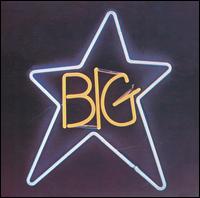 Big
Star: #1
Record (1972),
****
Big
Star: #1
Record (1972),
****
Every
time a band makes it
thanks to word-of-mouth, think of this: both the Velvet
Underground and Big Star gained fame even though there were few
copies of the albums to hear until they were reissued in the early
1980s. Big Star was one of the first American power-pop bands, and
arguably the best. They were sincere: singing about broken loves, the
lives of teenagers, probably their own lives. Their sound was based
on the Beatles, the Kinks, the Byrds, and anyone who could be earnest
without devolving into a whine. Part of their secret lies in
production - never have guitars glittered so, and the vocal
harmonies, additional percussion give an overall feeling of hard work
until completion. There's a divide between the harder power-pop which
makes Badfinger look like professional hacks ("Feel", "When
My Baby's Beside Me", "In The Street", "Don't Lie
To Me" are all highlights), and more poignant, often acoustic,
songs ("Ballad of El Goodo" which just glistens,
"Thirteen", "Watch the Sunrise"). The albums sort
of trails off towards the end, with some lesser songs (the
second-rate flower-era "The India Song", "Try Again",
"Give Me Another Chance") all tending more towards their
lighter sound. Even so, they do all the little things right - the
tambourines, the noisy break in "Don't Lie To Me", sparse
use of keyboards, and the guitar solos. Granted, Chilton's vocals are
much stronger than Chris Bell's, but Bell is often singing about
frustration or trying to assure himself, and his vocals work well in
those situations. But my God, they had an ability to capture
adolescence with the folky "Thirteen", or the bored
teenagers with "In The Street". Everybody has been there -
driving around your little town at night with nothing to do, felt
like they have to keep trying in the face of failure, or wanted to
yell "don't lie to me!" These were ordinary kids, making
damn fine music.
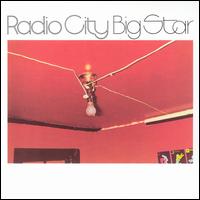 Big
Star: Radio
City (1974),
*****
Big
Star: Radio
City (1974),
*****
Radio
City is several things: it is uplifting, honest, heart wrenching, and
lovely. Bell left, off to fulfill his tragic destiny, and Chilton
scaled back the acoustic, putting more power in the power-pop. The
result is music with the Stones' brawn and grit, but firmly within
pop's realm ("Life is White", "Mod Lang"). Radio
City still
built on #1
Record;
it has teenage anthems ("Back of a Car", "September
Gurls"), and concludes with direct and honest solo acoustic song
("I'm in Love with a Girl"). Chilton was ever devoted to
the Beatles, and some of the slower, less guitar-oriented songs have
the mystical daze of the late Beatles around them ("Daisy
Glaze", the charming "Morpha Too"). Since I cannot
really do Radio
City justice,
(and indeed, there have been many words on the subject written
elsewhere), I just want to briefly mention a few factors in Big
Star's genius. One is their relationship with Ardent Studios, where
they recorded. The other albums power-pop that came out of the studio
at this time (Cargoe, and the Hot Dogs' Say
What You Mean)
also had the same finely tuned production. The band's close
relationship allowed the studio to perfect their sound further, in
the studio itself, a luxury which few bands had. The other is Jody
Stephens' drum style, which is bouncier, more varied and a bit more
forceful (and as a consequence, more interesting) than his
compatriots in Badfinger or the Stories,
to name a few. It seems that a lot of power-pop drummers tried to
update Ringo's style for the 70s, using a fuller but still basic
sound, while Stevens' playing has more depth. Whatever the elements,
Radio
City was
the crucible in which the band crystallized.
So
many conflicting emotions, all strong; so many mixed internal
signals. #1 Record reflects the teenage conundrum;
Radio
City is the condition itself.
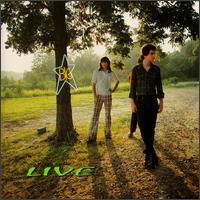 Big
Star: Live (rec. 1974, rel. 1992), **1/2
Big
Star: Live (rec. 1974, rel. 1992), **1/2
Big
Star never sold enough records to merit a live album during their
existence, but in 1974 they did a live in the studio session for a
Long Island radio station. Big Star fans will want Live, but it is
not essential. Just a trio (with John Lightman on bass) the set
lasts under fifty minutes. No real surprises in Chilton's selections:
mostly drawn from Radio
City and nothing from their to-be-recorded
third album. Chilton breaks out a mini acoustic set in the middle with
"Ballad of El Goodo," "Thirteen," "I'm in
Love with a Girl" and the album's lone surprise: Louden
Wainwright III's "Motel Blues." Their performance is fine,
but doesn't deviate much from the studio recordings.
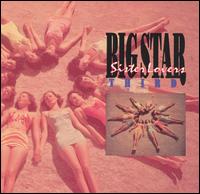 Big
Star: Third/Sister
Lovers (rec.
1974, rel. 1978), ****1/2
Big
Star: Third/Sister
Lovers (rec.
1974, rel. 1978), ****1/2
You
may hardly recognize Big Star on Third/Sister Lovers:
the band
sounds transformed. Hummel had left, Chilton's drug use slurred his
vocals, and the band's previous perfectionist simplicity was replaced
by sundry outside sounds: strings, female backing vocals, honking
saxophones. Sure, Third/Sister Lovers is a
power-pop album
more or less, but a deranged one. Chilton was messing with pop's
templates and creating moods, rather than recording any sustained
band performance. Their previous work was credibly created live;
T/SL's interwoven pieces would be a hindrance. The
electric
power-pop songs have messy strains of madness ("You Can't Have
Me", "Kizza Me", "Thank You Friends") and
Chilton's ballads are transformed into ragged voiced chamber-pop
("Stroke It Noel", "Blue Moon", "Take
Care"). At the other end, Big Star never sounded so numb and
down before - the solipsistic extension of previous moods like "Dazy
Glaze" comes on slow, bleak tracks like "Big Black Car"
or "Holocaust." Except for Stephens' "For You",
the whole album feels like Chilton couldn't decide whether to walk
away or keep on working. He was tired of giving himself and having it
not be noticed - "Get me out of here, I hate it here" he
sings in a quiet moment. This corrosive uncertainly leads
Third/Sister Lovers to have the same stand-offish
feel of many
artists who have turned their back on the mainstream, compounded with
the outpouring of one man's filtered mind. Their previous album's had
a pure feeling to them, as Bell and Chilton outpoured, but with T/SL,
Chilton's whole approach had changed; songs deal with frustration
("Thank You Friends", "You Can't Have Me"), or
with have a mocking tone ("Jesus Christ"). Velvet
Underground sounds come through as well, not only with a cover of
"Femme Fatale"
but in the feedback guitar part in "Kangaroo", and the
album's general pattern of cultural interference. Some of the work
also resembles another disturbed un-hero - Syd Barrett - not only
Chilton's slacker vocals, but the disquieting slide parts on songs
like "Holocaust." Chilton was not seeing things right, or
thinking things clearly, the same sort of quirkiness that inhabits
Barrett or Alexander Spence's work. Chilton wasn't that far out
there, but compared with their previous albums, he's on the moon. The
album was never really finished (how could it have been?) and was
released in 1978.
Out
of all the tracks on the CD issue, the half-joking cover of "Whole
Lotta Shakin' Goin On" became the unlikely blueprint for the rest of
Chilton's career.
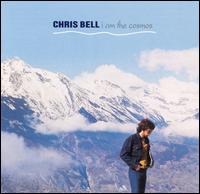 Chris
Bell: I am the Cosmos (rec. 1970s, rel. 1992), ****
Chris
Bell: I am the Cosmos (rec. 1970s, rel. 1992), ****
After
leaving Big Star, Bell recorded an album worth of material in Europe
with Rosebrough and bassist/organist Ken Woodley, which was unreleased
at the time. These solo recordings are the proper heir to Big
Star's first two albums - the Anglophile power-pop, acoustic work and
personal lyrics. The sheer amount of Big Star-like material
is
fantastic, and Bell acquits himself well on guitar. The title
track is an excellent example of what makes Bell good - instead of
self-propaganda or love proclamations, Bell sings of melancholy or
doubt ("Every night I tell myself I am the cosmos") over his riffs.
How he sings is also important; Bell's vocals were always the
weakest part of his contributions, offset in Big Star because Chilton
had The Voice. He had the habit of writing songs in keys too
high for himself - and braying as a result. Some of this is
to his advantage, reflecting the personal nature of his songs, perhaps
following John Lennon ("Look Up"). It's also a large sticking
point, and his voice probably derailed his attempts to sell the album
when recorded. But those who can live with his voice will
find a treasury of songs along the Big Star power-pop trajectory, such
as "Get Away", "I Don't Know" and the title track. He also
branched out - "You and Your Sister" and "Though I Know She Lies" fall
more as singer-songwriter works (with Chilton on backing vocals on the
former), and "Fight at the Table" is more rollicking old R&B
than anything else. On the whole, I Am the Cosmos has
some holes ("Make a Scene" has a great riff but lacks a strong middle,
"Fight at the Table" is a bit of a dud), and lacks the power of Big
Star's backing, but sounds more like Big Star's third album than Third/Sister Lovers.
After
he was unable to sell the album, Bell had a lot of personal problems
and largely left the music industry. Chris Stamey's Car
Records eventually released "I am the Cosmos" as a single with "You and
Your Sister" in 1978, but Bell died in a car accident soon afterwards.
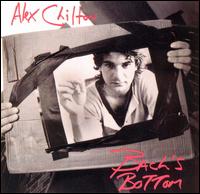 Alex Chilton:
Bach's Bottom
(rec. 1975-76, rel. various, mainly 1981), **1/2
Alex Chilton:
Bach's Bottom
(rec. 1975-76, rel. various, mainly 1981), **1/2
Chilton's
post-Big Star discography is a real mess, mainly because his
recordings had
limited and scattered release in the late 70s and early 80s.
And,
well, the reason for that may have been because it sounded like was
drunk/hungover and/or didn't give a damn and just screwed
around
in the studio, never
completing songs or playing tattered covers. Bach's Bottom
collects the 1975-76 sessions with producer Jon Tiven
and Memphis
regulars, which did not yield an LP, although portions were released on
the Singer
Not the
Song
EP in 1977. It's more of a historical document than a regular
album, including studio chatter and plenty of flunked takes.
But
hell, at this point it doesn't seem like Chilton could ever complete
a song. This is where he really started to lose focus,
sounding
more like the erratic Replacements-idol then the sharp Big Star
frontman. Chilton still had tremendous talent and
personality, even if he was steering back towards R&B and
regular
rock. "Take Me Home and Make Me Like It" is a drunken tirade,
but
the barroom antics and R&B feel make it something
from his own Exile
on Main Street.
While its a good song Chilton was a mess and Bach's Bottom
has
three versions of the song, the latter two turning into shaky jams.
Even the other good power-pop songs have dark clouds: Tiven's
"(Every Time I) Close My Eyes" is about strong disorientation, and "All
of the Time" flies everywhere. Otherwise the album is
disordered
covers or workings of older material (1970's
"Free Again" shows up twice, for example). Some of these
would be
generously called avant-pop or low-fi ("Walking Dead" about zombie
lovers), but mainly they are just incomplete disasters.
The
CD release also has both sides of Chilton's 1979 single Bangkok/ Can't
Seem to Make You Mine, which was recorded in late 1977 with
Chilton playing about everything. The A-Side is a tight,
non-PC
song that was probably the most coherent thing he'd recorded in years,
with Chilton singing about "living on Chinese rocks" amidst echoey
guitar and laughs. The B-Side is the old Seeds tune, with
some
exaggerated Richard Hell style vocals. Both have a rockabilly
feel to them.
Both Chilton and Bell were
involved with the Prix
recordings made around this time.
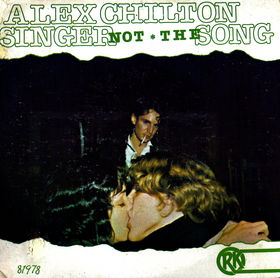 Alex Chilton: Singer Not
the Song
EP (1977)
Alex Chilton: Singer Not
the Song
EP (1977)
You
might be able to find this album, but since Bach's
Bottom
has these songs, there's no need. Officially Chilton's
solo debut, it had "Free Again", the title track, "Take Me Home and
Make
Me Like It", "All the Time" and a snippet of "Summertime Blues".
Released on Ork Records, run by
Television manager Terry Ork, which also released that band's first
single in 1975, among others.
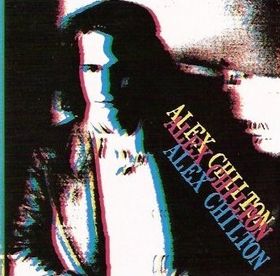 Alex
Chilton: One Day in
New York
(1978)
Alex
Chilton: One Day in
New York
(1978)
This may
have been released only in
Japan,
with a limited release here later in 1991(?).
(If that sounds odd, remember that Third/Sister Lovers
was only released around this time.) Hard to find any
information about it, but it looks/sounds like it
combined Singer Not
the Song EP with tracks recorded live
at
CGBG's with
his band the
Cossacks (including Chris Stamey, a drummer and a
keyboardist).
Regardless, it has some historical interest; the sound
quality is that of a good soundboard bootleg, but the brevity of it
makes it really only for Chilton diehards. The core band
sounds
pretty good, even if Chilton is somewhat
sloppy - flubbing vocals, etc., and the often organ setting sounds like
a 60s roller rink special. Only six tracks, it
opens with a guitar-led version of "Holocaust", complete with feedback
solos. Two classic Big Star tracks appear in fine form:
"In the Street" and "Baby Beside Me", and he tosses in Bach's "Take Me
Home
and Make Me Like It" also. The more unknown tracks are "A
Little
Fishy" - an otherwise unheard reverb-endowed 50s styled song with
vaguely obscene lyrics, and a cover of "More" where Chilton and the
band discuss what they're going to play for most of the track before
launching into a fake lounge version.
Alex Chilton: Bangkok / Can't Seem to Make You
Mine 7" (1978)
This appears on the CD release of Bach's
Bottom,
so see that review. The A-Side was recorded Oct. 1977 with
Chris
Stamey on maracas, and the B-Side two month later with Chris Merrick on
drums. Released
on Fun Records, probably part of Lust/Unlust Records.
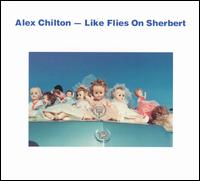 Alex
Chilton: Like Flies on
Sherbet (1979), ***
Alex
Chilton: Like Flies on
Sherbet (1979), ***
Not
for the
faint of heart; those who enjoy Chilton's personality will enjoy this,
but it's pretty far removed from power-pop, and this
may be one of the best bad albums I've ever heard. My guess is that
Chilton decided to record a version of his live act, which was a pile
of sloppy old blues, R&B and early rock and roll. It's hard to tell if
he's in on the
joke, or just providing his own damaged versions of these songs; the sound quality
varies, the playing is elemental.
It's
as if
New York rock deconstructionists framed their act as a rock revival
show. Sure most of its pretty messed up,
but Chilton's charm holds things together, and he sounds far more lucid
than he does on Bach's
Bottom.
The production is similarly shaky and all over the map ("My
Rival", "No More the Moon Shines"), but that seems consistent with
Chilton's adoption of no-take punk methodology, as opposed to his
previous abortive sessions. It's back to 1970's
method of Chilton changing his voice to impersonate others on covers,
("I've Had
It", Elvis on "Girl after Girl", "Waltz Across Texas"), and he tries to
re-create
the feel
of the original recordings.
Chilton's
own songs are pretty good: the R&B of "Hook or Crook"
or "My
Rival" or the VU-like
"Hey! Little Child", and they made up the bulk of the original LP.
(The CD version adds additional covers, and the B-Side "No
More
the Moon Shines" and weighs down the album). So,
Chilton goes in, quickly records these tunes, distresses the
sound and production to appropriate levels (or does not correct them),
and presto: Like Flies
on Sherbet. It may lack to highs of Bach's Bottom, but
it's more consistent, even if it engenders instant hate. Whatever Like Flies on Sherbet
is, it's unique, and I doubt anybody else was playing damaged f-you
covers of rockabilly and country at the time.
Tav
Falco & The Panther Burns EP (1980)
Falco
was another Memphis musician, artist, cool kid, etc. who put
together a band with Chilton on lead guitar and drums(?).
Reportedly roots blues + punk? Honestly, I'm only
including it because it doesn't appear in
Chilton's discography often, not because I intend to seek
it out.
Tav Falco & The
Panther Burns: The
Unreleased Sessions
(rec. 1980, rel. 1994)
Apparently
even this relatively obscure project had unreleased recordings
which
later were released.
Tav Falco & The
Panther Burns: Behind the
Magnolia Curtain (rec.
1981, rel. 1982)
Eh? Magnolia curtain sounds like a terrific euphemism.
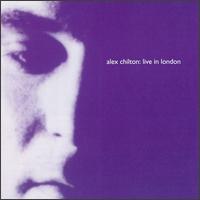 Alex
Chilton: Live in London (rec. 1980, rel. 1982)
Alex
Chilton: Live in London (rec. 1980, rel. 1982)
Aura Records in the
UK had released Big Star's third album, Like Flies on Sherbet,
and "Hey! Little Child" as a single before Chilton recorded
this live album for it in May
of 1980. Despite an intriguing backing band - The
Soft Boys' rhythm section, plus The Vibrators' Knox on guitar - the
album is mainly going to appeal to fans of Chilton's lost years.
The sound is middling at best - Matthew Seligman's bass is
buried, and I was not even aware there was a second guitarist until I
checked the credits. It is a shame really - Chilton ragged charm is
obvious, and the setlist is a good overview of his career, from the Box
Tops ("The Letter") to Big Star ("In the Street", "September Gurls",
"Kanga Roo" and "Nighttime"), with the remainder mostly drawn from Like
Flies on Sherbet's stronger
tracks ("Hey! Little Child" and "My Rival" among them).
(Interesting enough, nothing from the Bach's
Bottom
era appears). The rhythm section provides adequate bounce, but the
tape's sound and Chilton's half-assing make this ancillary to his other
work. Produced by Aaron Sixx, the founder of Aura
Records; I don't think it was released in the
US.
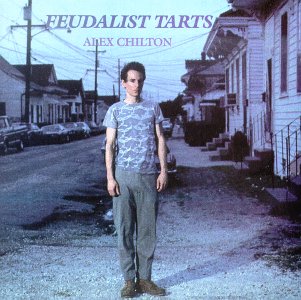 Alex Chilton: Feudalist
Tarts EP
(1985), ***
Alex Chilton: Feudalist
Tarts EP
(1985), ***
Chilton's
recording career took an ever more unexpected turn at this point, as he
did the least expected: playing it straight. The next
few releases are largely R&B, soul
or jazz songs, a majority of which are covers of now-forgotten tunes.
It's pretty clear
this was music that Chilton loved, having devoted a good portion of Like Flies on Sherbet
to train-wreck covers of these types of songs. Everything is
recorded very cleanly usually with Chilton's guitar
down in the mix, a jazz-inflected
rhythm
section and polite horns added sometimes;
all in all, it sounds like a
stripped-down Bill Laswell production. With hindsight, it
makes
more sense:
many rock artists eventually calm down and return to more basic sounds
-
folk, rock, etc. For Chilton, this home would have been the
songs
from Box Tops-era Memphis. Put it context
with
contemporary New York sounds from Laswell, groups like the
Lounge
Lizards or the Raybeats, and this approach seems
fairly
normal.
Feudalist Tarts
was the first of these recordings, bundling three covers with three
Chiltron originals. The
covers all sound good: the R&B of Slim Harpo's "Tee Ni Nee Ni
Noo"
and Willie Tee's "Thank You John", where Chilton gets to sing some
choice hokey phrases "you're a real prize turkey."
Chilton's own songs are given the same treatment,
and aside from their clearly contemporary lyrics, are siblings to his
cover selections. The strongest is "Stuff", a jazzy, low-key
song about scoring
some H or loving (you can decide), with a long instrumental middle
featuring the polite horns. The others are
"Lost My Job", a blues song with some Robert Johnson-like
slide but contemporary lyrics, and a bouncy R&B tune straight
out of the past ("Paradise"). The whole thing
has the feel of a clean-cut bar band and Chilton seems to be having fun
in the role of bandleader, even if it's nothing very substantial.
Re-releases
usually combine this with other releases, such as No Sex and High Priest, or
with Black List.
The rhythm section is bassist René Coman
from the Panther Burns, and drummer Doug Garrison, with whom Chilton
toured in this era.
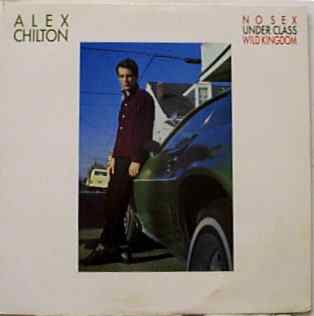 Alex
Chilton: No Sex
7"/12"
(1986), ***1/2
Alex
Chilton: No Sex
7"/12"
(1986), ***1/2
Actually
three different releases. The most basic: a 7" single, with
"Underclass" on the B-Side. The middle: a 12" release with
"Wild
Kingdom" included. The deluxe: two 7" inches, with live
versions
of "September Gurls" and "I'm Gonna Make You Mine" recorded live in
Paris in 1985. Re-releases tend to use three middle, three
song
version. I think the live tracks are appended to re-issues of
Black
List,
for whatever reason.
The three
song EP is actually much stronger than
Feudalist Tarts,
even though they share the same clean sound. All three are Chilton
originals and rock a touch harder than Feudalist Tarts.
"No Sex" is a rocking tongue-in-cheek song about the AIDS
retrovirus, with good memorable lines like "fuck me and die."
"Underclass" is another slide guitar blues song like Fedualist
Tarts'
"Lost My Job", but burns a bit harder, as Chilton sings "people think
that I'm a rich musician / but no, that isn't my condition / let me
just describe my position / it's down, way down." The third
song,
"Wild Kingdom" is his strongest song yet from this incarnation: a jazz
song, built around some simple guitar riff, some smoother Mose
Allison-like singing from Chilton, and a strong improv-like section in
the middle between the band members while a sax occasionally wails in
the background. Etherial, and easily could be the theme song
to
American Psycho.
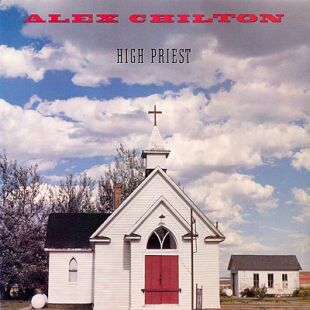 Alex
Chilton: High Priest
(1987), **1/2
Alex
Chilton: High Priest
(1987), **1/2
The
first full studio album since Like
Flies on Sherbet,
and it's as much a
grab bag as the preceeding EPs and singles. The production is
bit
more expansive, some piano and backing vocals here and there, but
essentially the three-piece and occasional
horns.
Musically, there's a core of his clean shirt, bar-room R&B
("Dalai
Lama", "Rauchy", "Forbidden Love"), but he's ventures all over the
place: 60s soul ("Make a Little Love"), gospel ("Come By Here"), old
school blues ("Trouble Don't Last", "Don't Be a Drag"), even trotting
out a cover of "Volare" of which Bill Murray's fake lounge singer would
approve. Chilton only contributed four songs, of which the
strongest is "Thing for You" a goofy sexy number, although "Forbidden
Love" is an excellent example of the smoke-filled nightclub sound which
pervades the album. His sense of humor is still apparent,
from
the joking of "Dalai Lama" (which is kind of tedious) to the sarcastic
take on "Make a Little Love." The whole affair sounds like
Chilton's personal radio station - as the best tracks include a
straight cover of an old Goffin/King song ("Let Me Get Close to You"
which sounds like it could have been from mid-60s, the aforementioned
"Thing for You", the R&B "Nobody's Fool" and the gospel soul of
"Come by Here" - all of which sound like recreations. The
whole
thing may have been baffling in the mid-80s, but it might just be
Chilton's memory journal.
Alex Chilton: Make a
Little Love (1987) [single]
In
France, a single with the A side drawn from High
Priest;
the B-side,
"Lonely Weekends" is a bonus track to the original CD version of that
album. In the United States, a promo 12" with only the title
track.
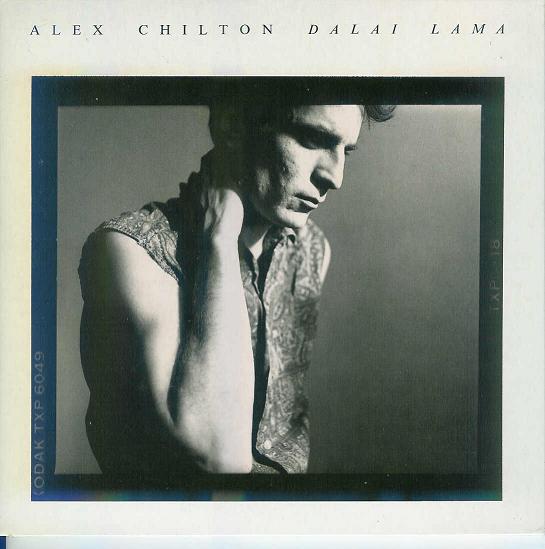 Alex Chilton: Dalai Lama
EP (1988), **ish
Alex Chilton: Dalai Lama
EP (1988), **ish
These
tracks are usually found on CD releases of High
Priest,
although the LP version of that album lacked them. "Margie"
is
rockabilliy highlighted by good timey piano, "Junkyard" is more
restrained R&B with some nice dirty romance about its subject
and
gives Chilton a bit to play some leads. The closer, "Rubber
Room"
is something like reverb-heavy psychobilly, but way too slow and not as
fun as that description.
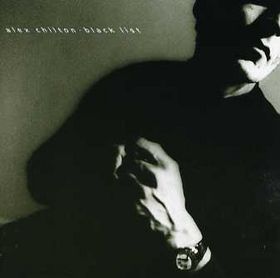 Alex
Chilton: Black List
EP (1990), **ish (again)
Alex
Chilton: Black List
EP (1990), **ish (again)
More
documentation of Chilton's karaoke period. Stylistically it's
much the same as contemporaneous releases - mostly old-school
R&B,
this time with saxophone in the mix, again sounding like a smooth
barroom band, if that makes any sense. The bulk of the album
is
originals, although "Jailbait" and "Baby Baby Baby" are in the same
retro style. "Guantanamerika" sounds similar, but its
satirical
lyrics are more cutting and it is really the only time Chilton shows
any spark. The covers are fine. Water treading.
A recent CD
reissue adds additional tracks - the two live tracks from the second No
Sex
7" - "September Gurls" and "I'm Gonna Make You Mine", along with "With
a Girl Like You" and a version of Bach's
Bottom's
"Take Me Home and Make Me Like It", which I'm guessing are also live.
Big Star: Live at
Missouri University (4.25.93) (1993)
Chilton, Stephens and two guys from the Posies: Jon Baur (guitar,
vocals) and Ken Stringfellow (guitar, bass). This exists.
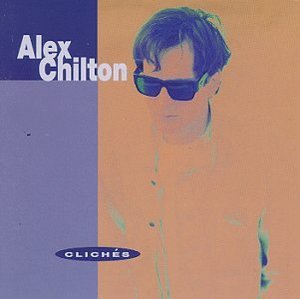 Alex Chilton: Clichés
(1994), ***
Alex Chilton: Clichés
(1994), ***
Something
different, at last: a solo album of mostly jazz standards done with
acoustic guitar. It continues Chilton's trend of paying
homage to
the music he enjoyed (and then ripped up in the early 80s), and his
apparent disinterest in doing anything commercial. Clichés
sounds like it was recorded live in the studio, and Chilton's
handpicked jazz guitar is decent. His voice is in fine form,
although he's hardly a crooner - he doesn't have the vibrato or
smoothness or a traditional jazz singer. His selections are
fine
- Cole Porter's "All of You", "The Christmas Song" among the old
standards, and a couple of good instrumentals which deviate from
jazz (a "Gavotte" from Bach, Slide Hampton's "Frame the
Blues").
I guess he had some surprises in him after all.
Produced by
Chilton and Keith Keller.
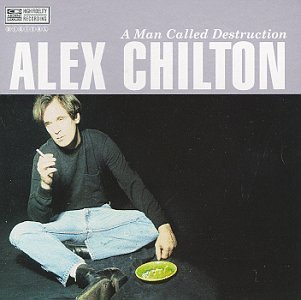 Alex Chilton: A Man
Called Destruction (1995), **1/2
Alex Chilton: A Man
Called Destruction (1995), **1/2
A return to
his adult non-contemporary streak from the mid-80s, but
this is a slightly stronger collection, probably because Chilton plays
more guitar. The best songs are his cover of the old
R&B tune
"Sick and Tired" or the smoked-glass ashtray era "What's Your Sign,
Girl?"
Otherwise, he jumps around from early R&R (the
Chilton-penned
instrumental "Boplexity"), traditional blues ("You Don't Have to Go"),
even a Jan & Dean cover ("The New Girl in School") among the
rest.
His own songs are a bit more guitar-focused and pretty
good. "Devil Girl" displaying his sense of humor, while the
nightclub lament of "Don't Know Anymore" is the strongest original.
But really, no artistic change since he started doing this
material fairly straight after self-distressing it on Like
Flies on Sherbet.
Self-produced.
Alex Chilton: Margie /
Hide & Seek (1996)
The A-Side may be the song on the Dalai
Lama EP; no idea if the B-Side was released before.
Alan Vega / Alex Chilton / Ben Vaughn: Cubist Blues (1996)
A session between Chilton, the ex-Suicide singer Vega, and Ben
Vaughn.
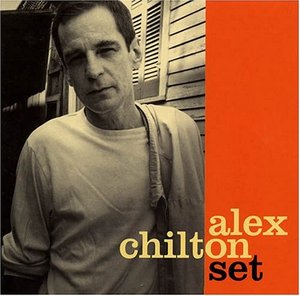 Alex Chilton: Set [aka
Loose Shoes and Tight
Pussy] (1999),
***
Alex Chilton: Set [aka
Loose Shoes and Tight
Pussy] (1999),
***
Chilton sounds further reanimated on Set, and the album
has his best curated selection of covers, drawing from his jazz
interest as well as the usual R&B and soul material.
The prodution sounds a bit better as well, even if Chilton
was acting like an extremely talented club player at this point.
It's a return to the trio format, but without any additional
players, and Chilton's guitar work sounds very good, even if he doesn't
do anything flashy. To these Midwestern ears, few of these songs are familiar;
"I've Never Found a Girl", "Hook Me Up" or "Lipstick Traces"
had faded from public consciousness by this time. Similarly, I doubt I would have encountered
a country song like Gary Stewart's "Single Again" elsewhere. The jazz material (now
electrified) sounds great as well: "April in Paris", "There Will Never
Be Another You", "Shiny Stockings" (with Chilton using his tremolo,
which he rarely seemed to do). Sure, some of these songs
aren't as memorable ("I Remember Mama" or the delightfully titled
"You've Got a Booger Bear Under There"). Chilton was having a
good time here, with a touch of irony in his voice sometimes.
(That's probably appropriate given this was the age of
Pavement. In fact, we might find Malkmus doing something
similar twenty years down the road). This was Chilton's last
studio album, and in some ways it's a fitting companion to 1970
- both find
Chilton interpreting songs he enjoyed. But while 1970 had moments
where Chilton seemed to sing "as himself", by Set he was mostly
doing so, even if it wasn't his own material. Self-produced.
Alex Chilton: Live in
Anvers (2004)
He actually plays a couple of things from his back catalog! Do not have.
Big Star: In Space
(2005)
Chilton, Stephens and the Posies gents. Have not heard it.
 The
Box
Tops: Cry
Like a Baby
(1968), **
The
Box
Tops: Cry
Like a Baby
(1968), **


 Big
Star: #1
Record (1972),
****
Big
Star: #1
Record (1972),
**** Big
Star: Radio
City (1974),
*****
Big
Star: Radio
City (1974),
*****
 Big
Star: Third/Sister
Lovers (rec.
1974, rel. 1978), ****1/2
Big
Star: Third/Sister
Lovers (rec.
1974, rel. 1978), ****1/2 Chris
Bell: I am the Cosmos (rec. 1970s, rel. 1992),
Chris
Bell: I am the Cosmos (rec. 1970s, rel. 1992), 
 Alex Chilton:
Alex Chilton:  Alex
Chilton:
Alex
Chilton:  Alex
Chilton:
Alex
Chilton:  Alex
Chilton:
Alex
Chilton:  Alex Chilton:
Alex Chilton:  Alex
Chilton:
Alex
Chilton:  Alex
Chilton:
Alex
Chilton: 
 Alex
Chilton:
Alex
Chilton:  Alex Chilton:
Alex Chilton:  Alex Chilton:
Alex Chilton:  Alex Chilton:
Alex Chilton: